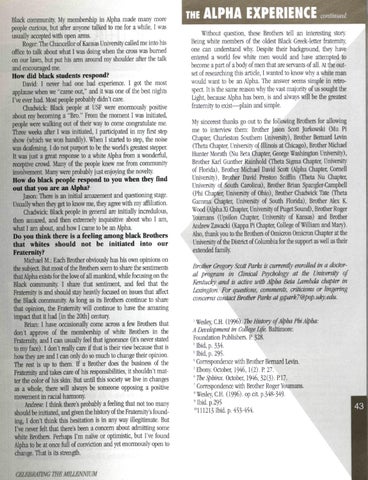Black community. My membership in Alpha made many more people curious, but after anyone talked to me for a while, I was usually accepted with open arms. Roger: The Chancellor of Kansas University called me into his office to talk about what I was doing when the cross was burned on our lawn, but put his arm around my shoulder after the talk and encouraged me. How did black students respond? David: I never had one bad experience. I got the most applause when we "came out," and it was one of the best nights I've ever had. Most people probably didn't care. Chadwick: Black people at USF were enormously positive about my becoming a "Bro." From the moment I was initiated, people were walking out of their way to come congratulate me. Three weeks after I was initiated, I participated in my first step show (which we won handily). When I started to step, the noise was deafening. I do not purport to be the world's greatest stepper. It was just a great response to a white Alpha from a wonderful, receptive crowd. Many of the people knew me from community involvement. Many were probably just enjoying the novelty. How do black people respond to you when they find out that you are an Alpha? Jason: There is an initial amazement and questioning stage. Usually when they get to know me, they agree with my affiliation. Chadwick: Black people in general are initially incredulous, then amazed, and then extremely inquisitive about who I am, what I am about, and how I came to be an Alpha. Do you think there is a feeling among black Brothers that whites should not be initiated into our Fraternity? Michael M.: Each Brother obviously has his own opinions on the subject. But most of the Brothers seem to share the sentiments that Alpha exists for the love of all mankind, while focusing on the Black community. I share that sentiment, and feel that the Fraternity is and should stay heavily focused on issues that affect the Black community. As long as its Brothers continue to share that opinion, the Fraternity will continue to have the amazing impact that it had [in the 20th] century. Brian: I have occasionally come across a few Brothers that don't approve of the membership of white Brothers in the Fraternity, and I can usually feel that ignorance (it's never stated to my face). I don't really care if that is their view because that is how they are and I can only do so much to change their opinion. The rest is up to them. If a Brother does the business of the Fraternity and takes care of his responsibilities, it shouldn't matter the color of his skin. But until this society we live in changes as a whole, there will always be someone opposing a positive movement in racial harmony. Andrew: I think there's probably a feeling that not too many should be initiated, and given the history of the Fraternity's founding, I don't think this hesitation is in any way illegitimate. But I've never felt that there's been a concern about admitting some white Brothers. Perhaps I'm naive or optimistic, but I've found Alpha to be at once full of conviction and yet enormously open to change. That is its strength.
CELEBRATING THE MILLENNIUM
THE ALPHA EXPERIENCE continued: Without question, these Brothers tell an interesting story. Being white members of the oldest Black Greek-letter fraternity, one can understand why. Despite their background, they have entered a world few white men would and have attempted to become a part of a body of men that are servants of all. At the outset of researching this article, I wanted to know why a white man would want to be an Alpha. The answer seems simple in retrospect. It is the same reason why the vast majority of us sought the Light, because Alpha has been, is and always will be the greatest fraternity to exist—plain and simple. My sincerest thanks go out to the following Brothers for allowing me to interview them: Brother Jason Scott Jurkowski (Mu Pi Chapter, Charleston Southern University), Brother Bernard Levin (Theta Chapter, University of Illinois at Chicago), Brother Michael Hunter Morath (Nu Beta Chapter, George Washington University), Brother Karl Gunther Rainhold (Theta Sigma Chapter, University of Florida), Brother Michael David Scott (Alpha Chapter, Cornell University), Brother David Preston Sniffin (Theta Nu Chapter, University of South Carolina), Brother Brian Spangler-Campbell (Phi Chapter, University of Ohio), Brother Chadwick Tate (Theta Gamma Chapter, University of South Florida), Brother Alex K. Wood (AlphaXi Chapter, University of Puget Sound), Brother Roger Youmans (Upsilon Chapter, University of Kansas) and Brother Andrew Zawacki (Kappa Pi Chapter, College of William and Mary). Also, thank you to the Brothers of Omicron Omicron Chapter at the University of the District of Columbia for the support as well as their extended family. Brother Gregory Scott Parks is currently enrolled in a doctoral program in Clinical Psychology at the University of Kentucky and is active with Alpha Beta Lambda chapter in Lexington. For questions, comments, criticisms or lingering concerns contact Brother Parks at gspark7@pop.uky.edu.
1
Wesley, C.H. (1996). The History ofAlpha Phi Alpha: A Development in College Life. Baltimore: Foundation Publishers. P. 328. 2 Ibid, p. 334. 5 Ibid, p. 295. 4 Correspondence with Brother Bernard Levin. 5 Ebony. October, 1946,1(2). P. 27. 6 The Sphinx. October, 1946,32(3). P.17. 7 Correspondence with Brother Roger Youmans. 8 Wesley, C.H. (1996). op cit. p.348-349. 9 Ibid, p.295 10 111213 Ibid. p. 453-454.
